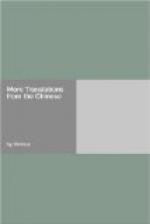“I-hsi! alas!” I said, “this must be the sound of Autumn. Oh, why has Autumn come? For as to Autumn’s form, her colours are mournful and pale. Mists scatter and clouds withdraw. Her aspect is clean and bright. The sky is high and the sunlight clear as crystal. Her breath is shivering and raw, pricking men’s skin and bones; her thoughts are desolate, bringing emptiness and silence to the rivers and hills. And hence it is that her whisperings are sorrowful and cold, but her shouts are wild and angry. Pleasant grasses grew soft and green, vying in rankness. Fair trees knit their shade and gave delight. Autumn swept the grasses and their colour changed; she met the trees, and their boughs were stripped. And because Autumn’s being is compounded of sternness, therefore it was that they withered and perished, fell and decayed. For Autumn is an executioner,[3] and her hour is darkness. She is a warrior, and her element is metal. Therefore she is called ’the doom-spirit of heaven and earth’;[4] for her thoughts are bent on stern destruction.
[3] Executions took place in autumn. See Chou Li, Book xxxiv (Biot’s translation, tom. ii, p. 286).
[4] “Book of Rites,” I. 656 (Couvreur’s edition).
“In Spring, growth; in Autumn, fruit: that is Heaven’s plan. Therefore in music the note shang is the symbol of the West and I-tse1 is the pitch-pipe of the seventh month. For shang means ‘to strike’; when things grow old they are stricken by grief. And I means ’to slay’; things that have passed their prime must needs be slain. Plants and trees have no feelings; when their time comes they are blown down. But man moves and lives and is of creatures most divine. A hundred griefs assail his heart, ten thousand tasks wear out his limbs, and each inward stirring shakes the atoms of his soul. And all the more, when he thinks of things that his strength cannot achieve or grieves at things his mind cannot understand, is it strange that cheeks that were steeped in red should grow withered as an old stick, and hair that was black as ebony should turn as spangled as a starry sky? How should ought else but what is fashioned of brass or stone strive to outlast the splendour of a tree? Who but man himself is the slayer of his youth? Why was I angered at Autumn’s voice?”
The boy made no answer: he was sleeping with lowered head. I could hear nothing but the insects chirping shrilly on every side as though they sought to join in my lamentation.
APPENDIX
An essay on Po Chuu-i, whose poems occupy most of this book, will be found in “170 Chinese Poems.” The fullest account of Li Po’s life (with translations) is given in a paper read by me to the China Society, and published in the Asiatic Review, July, 1919. Notices of Ch`uu Yuuan, Wang Wei, Yuuan Chen1, Wang Chien and Ou-yang Hsiu will be found in Giles’s “Biographical Dictionary.” To Wang Chieh Po Chuu-i addressed several poems.




